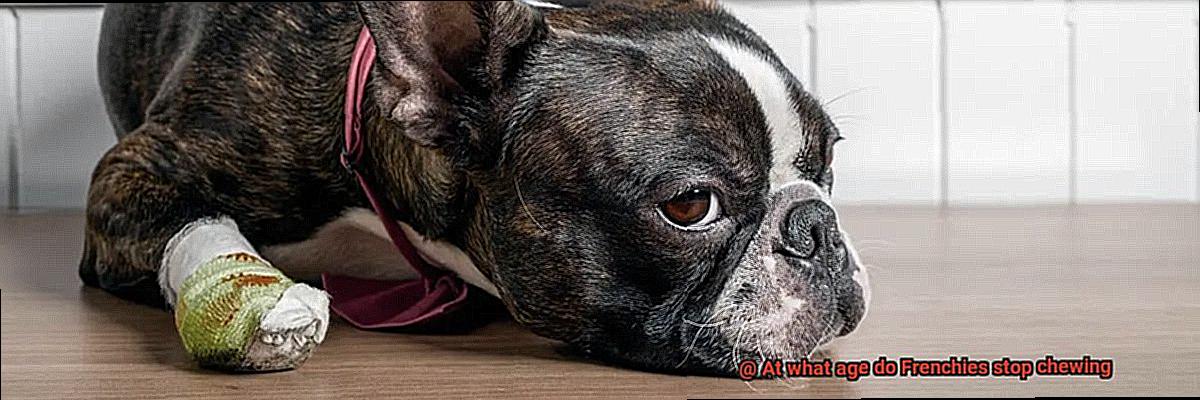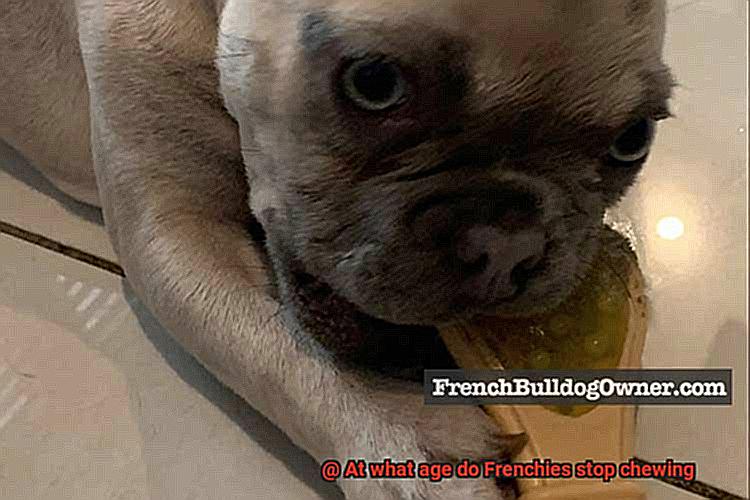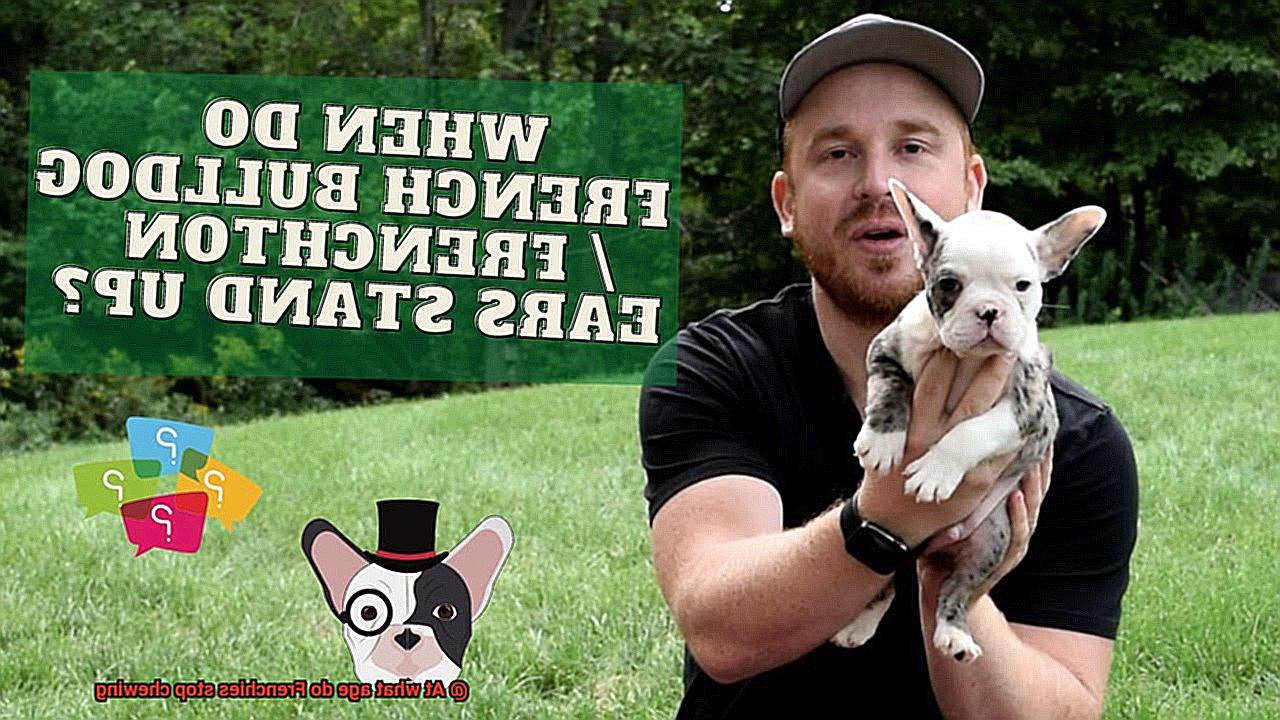At what age do Frenchies stop chewing?
French Bulldogs, those adorable little bundles of squishy cuteness, have a talent for chewing that can drive any owner to the brink. If you’re tired of replacing chewed shoes, furniture, or even your beloved remote control, fear not.
In this blog post, we’ll dive into the fascinating world of French Bulldog chewing habits and uncover the age at which these furry troublemakers usually outgrow this notorious behavior.
Why do French Bulldogs Chew?
Contents
- 1 Why do French Bulldogs Chew?
- 2 When does the Chewing Frenzy Stop?
- 3 Understanding the Natural Chewing Instincts of Frenchies
- 4 The Average Age When French Bulldogs Stop Chewing
- 5 Training Your Frenchie to Discourage Excessive Chewing
- 6 Providing Appropriate Outlets for Chewing Needs
- 7 Exercise and Mental Stimulation for Frenchies
- 8 Puppy Training Classes and Professional Obedience Training
- 9 Patience and Consistency in Training Efforts
- 10 Consulting with a Veterinarian or Animal Behaviorist
- 11 Conclusion
Just like their canine buddies, French Bulldogs are born with an innate need to explore the world with their mouths. Their youthful curiosity and zest for adventure often lead them straight to anything they can sink their teeth into. Similar to teething babies finding comfort in gnawing on objects, puppies (including Frenchies) use chewing as a way to soothe their gums during the teething phase.

When does the Chewing Frenzy Stop?
While every Frenchie is different, most start teething around three to four months old. This is when their baby teeth start falling out and making room for permanent ones. The teething phase can last for several months, during which time vigorous chewing is at its peak. However, as your Frenchie grows up, this behavior usually starts fading away between six to eight months old. By then, most French Bulldogs will have a full set of adult teeth and a significantly reduced urge to chew.
It’s important to note that even as Frenchies leave behind their insatiable chewing phase, providing appropriate chew toys and mental stimulation remains crucial. Encouraging positive chewing habits through interactive toys, dental chews, and regular training sessions will redirect their energy and keep your Frenchie content.

As responsible owners, it’s vital to understand that chewing is a natural behavior in French Bulldogs during their teething phase. While it can be a challenging time, with patience, consistent training, and the right tools, your Frenchie’s chewing habits will gradually fade away. By around six to eight months old, most French Bulldogs will bid farewell to their chewing antics, leaving you with a well-behaved and contented companion.
Understanding the Natural Chewing Instincts of Frenchies
French Bulldogs, also known as Frenchies, are beloved for their playful and mischievous nature. However, their natural instincts often include chewing on objects. To effectively address this behavior, it is important for owners to understand why Frenchies chew and how to provide appropriate outlets for their chewing needs.
- Teething Process: Just like human babies, puppies go through a teething process. For Frenchies, this typically starts around 3 to 4 months of age and can last until they are around 6 to 9 months old. Chewing helps alleviate the discomfort and itchiness associated with teething as their baby teeth fall out and are replaced by permanent teeth.
- Stress Relief and Dental Health: Even after their adult teeth have fully developed, Frenchies may continue to chew. Chewing offers them various benefits, including stress relief, boredom reduction, and anxiety management. It also helps keep their jaws strong and their teeth clean by removing plaque buildup.
- Providing Appropriate Chew Toys: To satisfy their natural chewing instincts, Frenchie owners should provide durable and safe chew toys or bones. These toys should be specifically designed for dogs to prevent any potential choking hazards. Offering a variety of textures and shapes can keep them engaged and prevent destructive chewing on furniture or other household items.
- Exercise and Mental Stimulation: Regular exercise and mental stimulation play a crucial role in curbing excessive chewing behavior. A tired Frenchie is less likely to engage in destructive chewing as they will be more focused on resting or playing with appropriate toys.
- Training and Positive Reinforcement: Training techniques can help redirect a Frenchie’s chewing behavior. Teaching them commands like “leave it” or “drop it” can discourage them from chewing on forbidden objects and encourage them to focus on their designated chew toys. Positive reinforcement, such as praising or rewarding them when they chew on appropriate items, can also reinforce good chewing habits.
- Individual Differences: Each Frenchie is unique, and the age at which they may stop chewing excessively can vary. Some Frenchies may naturally outgrow the habit as they mature, while others may require consistent training and management throughout their lives.
- Seeking Professional Help: If a Frenchie continues to exhibit excessive chewing behavior despite appropriate training and providing suitable chew toys, it may be worth consulting with a veterinarian or professional dog trainer. They can assess the underlying reasons for the behavior and provide tailored advice and solutions.
The Average Age When French Bulldogs Stop Chewing
Those cute little puppies just can’t seem to resist sinking their teeth into everything they can find. But fear not. There is light at the end of the chewed-up tunnel. As an expert on French Bulldogs, I’m here to give you the scoop on when these adorable pups typically stop chewing.
Teething Troubles
Like many other dog breeds, French Bulldogs go through a teething phase during their puppyhood. This usually occurs between the ages of 3 to 6 months. During this time, their baby teeth start to fall out, and their permanent teeth start to emerge. Chewing provides relief to their sore gums and helps them explore their environment.
The Average Age
So, when do French Bulldogs typically stop chewing? On average, most Frenchies tend to outgrow their chewing habits by the time they reach 6 to 9 months of age. By this time, their adult teeth should be fully developed, and their chewing behaviors should significantly decrease.
Factors That Can Influence Chewing Behavior
It’s important to note that every dog is unique, and some French Bulldogs may continue to chew beyond this age range. Factors such as individual temperament, training consistency, and environmental stimulation can influence how long a Frenchie continues to chew.
Redirecting Behavior
As a responsible owner, it’s important to provide your Frenchie with appropriate outlets for their chewing behavior. Introducing chew toys from an early age and encouraging positive chewing habits can help minimize destructive chewing tendencies in French Bulldogs. Be sure to choose toys that are safe and durable for your pup’s teeth and provide a variety of textures and shapes to keep them engaged.
Addressing Excessive Chewing
While most French Bulldogs outgrow their chewing habits naturally, some may continue to chew excessively due to boredom, separation anxiety, or other underlying issues. If your Frenchie continues to chew beyond the average age range, it’s advisable to consult with a veterinarian or professional dog trainer. They can help identify any underlying factors contributing to the excessive chewing and provide guidance on how to manage the behavior.
Training Your Frenchie to Discourage Excessive Chewing
The joys of owning a French Bulldog – their adorable squishy faces, their playful nature, and let’s not forget those razor-sharp puppy teeth. If you’ve found yourself constantly replacing chewed-up shoes or furniture, fear not. In this guide, we’ll explore effective strategies to train your Frenchie to discourage excessive chewing.
- Introduce Appropriate Chew Toys: Like a kid in a candy store, your Frenchie needs a variety of chew toys to satisfy their teething needs. Look for durable and safe options specifically designed for teething puppies. Some popular choices include rubber toys, dental chews, and puzzle toys that engage your Frenchie’s mind while providing a satisfying chewing experience.
- Positive Reinforcement: Remember, positive reinforcement is the key to success in training your Frenchie. When you catch them chewing on an appropriate toy, shower them with praise, treats, and belly rubs. This reinforces the idea that chewing on the toy is a rewarding behavior.
- Create a Safe Environment: Prevention is better than cure. Remove any tempting objects from your Frenchie’s reach to avoid confusion between acceptable and unacceptable items. Keep shoes, socks, and other valuable objects out of sight until your Frenchie has learned proper chewing habits.
- Mental and Physical Stimulation: A bored Frenchie is more likely to engage in excessive chewing. Keep them mentally stimulated by providing interactive toys and engaging in training sessions. Regular exercise is also crucial to burn off excess energy and prevent destructive behaviors.
- Consistency is Key: Consistency is vital in training any dog breed, including French Bulldogs. Ensure that everyone in your household follows the same rules and enforces appropriate chewing behavior. It only takes one slip-up for your Frenchie to think that chewing on your favorite slippers is fair game.
- Seek Professional Help if Needed: If despite your best efforts, your Frenchie continues to exhibit excessive chewing behavior, don’t hesitate to seek help from a professional dog trainer or behaviorist. They can provide personalized guidance and techniques to address the issue effectively.
In conclusion, training your Frenchie to discourage excessive chewing requires patience, consistency, and the right tools. By providing appropriate chew toys, using positive reinforcement, creating a safe environment, and keeping them mentally and physically stimulated, you’ll be well on your way to curbing those destructive chewing habits. Remember, it’s never too late to start training, so don’t give up – your Frenchie will thank you for it.
Providing Appropriate Outlets for Chewing Needs
French Bulldogs, known for their adorable wrinkled faces and playful personalities, also possess a natural instinct to chew. As responsible pet owners, it is crucial to provide appropriate outlets for their chewing needs. In this blog post, we will explore the importance of fulfilling your Frenchie’s chewing requirements and offer practical tips to ensure both their happiness and the safety of your belongings.
The Importance of Chewing for French Bulldogs:

- Chewing is a natural behavior that helps dogs explore their environment, relieve stress, and maintain healthy teeth.
- Lack of appropriate outlets for chewing can lead to destructive behavior, such as chewing on furniture or shoes.
Choose Durable Chew Toys:
- Look for chew toys specifically designed for strong chewers, made from durable materials like rubber or nylon.
- Interactive toys with hidden compartments or treat dispensers provide mental stimulation while satisfying their need to chew.
Rotate Toys Regularly:
- Keep your Frenchie engaged by rotating their chew toys regularly.
- This prevents boredom and reduces the likelihood of them seeking out inappropriate items to chew on.
Frozen Chew Toys for Teething Puppies:
- Frozen chew toys can provide relief from teething discomfort.
- The cold temperature soothes their gums and reduces inflammation.
Raw Bones and Antlers:
- Appropriately sized raw bones or antlers can be beneficial for your Frenchie to chew on.
- Supervise them while they chew to prevent choking or accidents.
Exercise and Mental Stimulation:
- Regular exercise and mental stimulation reduce chewing behavior in French Bulldogs.
- A tired and mentally stimulated dog is less likely to engage in destructive chewing out of boredom or frustration.
Training Good Chew Toy Manners:
- Teach your Frenchie which items are appropriate to chew on.
- Redirect their attention to their chew toys and reward them for making the right choice.
Seeking Professional Assistance:
- If your Frenchie continues to exhibit excessive chewing behavior, consult a professional dog trainer or behaviorist.
- They can help identify underlying issues and provide specific strategies to address the behavior.
Exercise and Mental Stimulation for Frenchies
French Bulldogs, with their adorable squished faces and playful personalities, bring so much joy to our lives. But did you know that regular exercise and mental stimulation are crucial for their overall well-being? In this article, we’ll delve into the importance of keeping your Frenchie physically and mentally active, and explore some fun ways to achieve this.
Physical Exercise: Finding the Right Balance
As a brachycephalic breed, French Bulldogs may find intense physical exercise challenging due to their shorter snouts. However, they still need daily exercise to maintain their health and mental well-being. Here are some tips for providing physical activity for your Frenchie:
- Long Walks: Take your Frenchie for leisurely strolls around the neighborhood. Aim for at least 30 minutes of moderate exercise per day. Remember to be mindful of their limitations and avoid overexertion.
- Play Sessions: Engage in interactive play sessions with your Frenchie using toys like balls or ropes. This not only provides physical exercise but also strengthens the bond between you and your furry companion.
- Doggy Playdates: Arrange playdates with other friendly dogs to give your Frenchie a chance to socialize and burn off excess energy.
Mental Stimulation: Keeping Their Curious Minds Sharp
French Bulldogs are intelligent dogs with curious minds. Without mental stimulation, they can become bored and resort to destructive chewing behaviors. Here’s how you can keep your Frenchie mentally stimulated:
- Puzzle Toys: Invest in puzzle toys that require your Frenchie to figure out how to retrieve treats or toys from inside. This challenges their problem-solving skills and keeps them mentally sharp.
- Training Sessions: Teach your Frenchie new commands or tricks. Training not only engages their mind but also strengthens the bond between you and your furry friend.
- Scent-based Activities: Incorporate scent-based activities into your Frenchie’s routine. Hide treats around the house and encourage them to use their nose to find them. You can also introduce them to new smells during outdoor walks.
Observing Your Frenchie’s Needs
It’s important to remember that every Frenchie is unique, and their exercise and mental stimulation needs may vary. Some Frenchies may require more exercise and mental challenges than others. Observe your dog’s behavior and adjust their routine accordingly.
Consulting with a professional trainer or behaviorist who specializes in brachycephalic breeds like French Bulldogs can provide additional guidance on the appropriate exercise and mental stimulation regimen for your Frenchie.
Start Early, Keep Going
Exercise and mental stimulation should be incorporated into your Frenchie’s daily routine from an early age and continued throughout their life. This will promote a healthy and well-balanced lifestyle for your furry friend.
Puppy Training Classes and Professional Obedience Training
French Bulldog puppies are notorious for their chewing habits. From nibbling on shoes to gnawing on furniture, these little rascals can wreak havoc on your home. But fear not. Puppy training classes and professional obedience training can help you address these chewing behaviors and save your sanity.
Why Do French Bulldogs Chew?
Chewing is a natural behavior for puppies. It helps them explore their surroundings and relieve teething discomfort. However, it’s important to guide them towards appropriate chew toys and discourage destructive chewing.
How Can Training Classes Help?
- Learn Effective Techniques: Puppy training classes provide an opportunity for owners to learn effective techniques and strategies to teach their puppies appropriate chewing habits. Trainers will show you how to redirect their chewing behavior towards acceptable alternatives.
- Positive Reinforcement: Trainers emphasize positive reinforcement techniques, rewarding desired behaviors with treats, praise, or playtime. This helps French Bulldogs associate positive experiences with appropriate chewing habits.
- Address Underlying Issues: Training classes also address other behavioral issues that may contribute to excessive chewing. Socialization opportunities allow puppies to interact with other dogs and people in a controlled environment, helping them build confidence and reduce anxiety – underlying causes of destructive chewing.
Professional Obedience Training: A Lifesaver
If your French Bulldog has already developed a habit of chewing on inappropriate items, professional obedience training can be a lifesaver.
- Basic Commands: Obedience training focuses on teaching dogs basic commands, impulse control, and proper behavior in various situations. This gives you the tools to redirect their attention and prevent destructive chewing.
- Consistency is Key: The effectiveness of puppy training classes and professional obedience training in curbing chewing habits depends on your consistency and dedication in implementing the techniques learned.
Patience and Consistency in Training Efforts
Is your French Bulldog turning your favorite pair of shoes into a chew toy? Don’t fret. With a little patience and consistency, you can guide your furry friend towards appropriate chewing behavior. So, grab your cape and get ready to become the superhero your Frenchie needs.
Understanding the Teething Phase:
Just like humans, dogs go through a teething phase. Frenchies typically start teething around 3 to 4 months of age and may continue until they are 6 to 8 months old. During this time, their gums may be sore, leading them to seek relief through chewing. It’s important to be patient with your Frenchie during this phase, as it is temporary.
Say No to Scolding:
Scolding or punishing your Frenchie for chewing is a big no-no. This can create fear and anxiety, exacerbating the behavior. Instead, provide appropriate chew toys and redirect their attention towards those. Patience is key here – remember, they’re just trying to find relief.
Consistency is Key:
Establishing a consistent routine is crucial in training efforts. Set clear boundaries and rules regarding what your Frenchie can chew on. Be consistent in enforcing these rules and redirecting their attention whenever they engage in inappropriate chewing behavior. Consistency helps them understand what is expected of them.
Stimulate Their Minds:
A bored Frenchie is a chewing Frenchie. Provide plenty of mental and physical stimulation to keep them engaged and less likely to resort to destructive chewing. Incorporate puzzle toys or interactive games that stimulate their minds. This will not only distract them from inappropriate chewing but also keep their minds sharp.
Praise and Reward:
Positive reinforcement is the secret weapon in training efforts. Whenever your Frenchie chews on appropriate items, such as their chew toys, make sure to praise and reward them. This reinforces the desired behavior and encourages them to continue chewing on appropriate items.
Be Patient, It Takes Time:
Remember, each Frenchie is unique, and the duration of the chewing phase can vary. Don’t lose hope if it takes longer than expected for your Frenchie to stop chewing. With time, consistency, and positive reinforcement, they will eventually learn to curb their chewing behavior.

Consulting with a Veterinarian or Animal Behaviorist
“Calling in the Canine Crusaders: Why You Need a Vet or Behaviorist for Chewing Woes”
The Health Check-up: Saving the Day, One Sniff at a Time
Before donning their capes, veterinarians will conduct a thorough health examination of your French Bulldog. Chewing can sometimes be a symptom of underlying medical issues such as dental problems, gastrointestinal discomfort, or nutritional deficiencies. By ruling out any potential health concerns, they can focus on the behavioral aspects of chewing.
The Super Investigator: Unmasking the Triggers
Once the health check-up is complete, it’s time for the animal behaviorist to step in as the super investigator. They will analyze your French Bulldog’s behavior and environment to identify triggers that lead to chewing episodes. Are they bored? Anxious? Seeking attention? By pinpointing these triggers, they can develop a customized plan to address the chewing behavior.
The Dynamic Duo: Tag-Teaming for Success
With their powers combined, veterinarians and animal behaviorists create a formidable team against chewing woes. They may recommend environmental modifications such as removing access to tempting objects or providing appropriate chew toys. Positive reinforcement training techniques may also be enlisted to redirect your French Bulldog’s chewing tendencies.
Patience and Consistency: The Secret Weapon
As with any superhero mission, success doesn’t happen overnight. It requires patience and consistency to change behavior. Following the guidance provided by your veterinarian or animal behaviorist is key. Regular follow-up appointments may be necessary to monitor progress and make any necessary adjustments to the behavior modification plan.
Beyond Chewing: Unleashing a Happier, Well-Behaved Frenchie
Consulting with a veterinarian or animal behaviorist is not just about addressing chewing behavior; it’s about ensuring your French Bulldog’s overall well-being and mental stimulation. These professionals can offer valuable insights into providing a stimulating environment and addressing any other behavioral issues your Frenchie may be experiencing.
0Rkg0FXRDTs” >
Conclusion
French Bulldogs, known for their playful and mischievous nature, can be notorious chewers during their early years. However, as they mature, this destructive behavior tends to subside. The age at which Frenchies stop chewing varies from dog to dog, but generally, you can expect a significant improvement by the time they reach one to two years old.
During their puppyhood, French Bulldogs experience teething just like any other breed. This phase typically lasts until they are around six months old. During this time, it’s crucial to provide them with appropriate chew toys and redirect their attention away from your favorite pair of shoes or furniture.
As Frenchies grow older and their adult teeth fully develop, they tend to become less inclined to chew on everything in sight. Their natural curiosity may still lead them to explore objects with their mouths occasionally, but the intensity of chewing diminishes significantly.
It’s important to note that individual dogs may have different timelines when it comes to stopping this behavior entirely. Some French Bulldogs may continue chewing beyond the age of two due to various factors such as boredom, anxiety, or lack of proper training and mental stimulation.
To prevent unwanted chewing habits from persisting into adulthood, it is essential to establish consistent boundaries and provide plenty of physical and mental exercise for your Frenchie. Engaging them in interactive play sessions and providing puzzle toys can help redirect their energy towards more appropriate outlets.
In conclusion, while there is no definitive age at which all French Bulldogs stop chewing completely, most will show a noticeable decrease in this behavior by the time they reach one to two years old.




